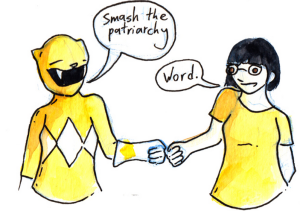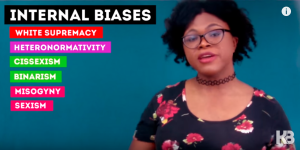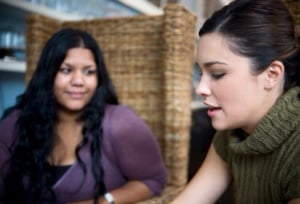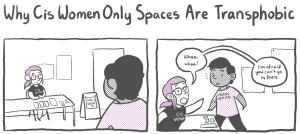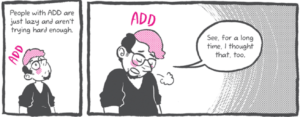So, I’m a pretty hardcore feminist. I’m a Women and Gender Studies major in college; I write for feminist websites like RH Reality Check, Everyday Feminism, Adios Barbie; and I’ve done a lot of internships working for nonprofits.
I’m pretty much dedicating my life to being a professional feminist. But that doesn’t mean that you have to.
I think one of the biggest misconceptions about feminism is that you have to be super hardcore, you have to dedicate your life to it, and unless you go full-force, you’re not doing it right. And I’m here to tell you that that is not true.
Feminism is an ideology, so it’s all about the way that you approach the world and live your life. There are so many ways that you can take feminism into your everyday life and not really change anything about your life, but make it more feminist and come from a feminist approach.
So I’m going to give you six ways today that you can do that.
The first thing is to check your privilege. We all have privilege. I guess maybe there’s someone in the world without any, but you can pretty much assume you have privilege. Privilege means that you have some type of automatic entitlement in society.
For example, I’m white. That means I have white privilege. That means that in society, I get preferential treatment just because I’m white. And that means I have access to more resources, it means that I don’t face the same discrimination or prejudice that people of color do, it means I can see people of my race represented in the media, etc.
And with that comes learning about oppression, learning about people’s experiences that are marginalized. Really learning about your privilege and the privileges that you have, and then learning to check those privileges: that’s probably one of the most feminist things you can do.
The next way you can be more feminist in your everyday life is to read some feminist books! I personally love, love, love reading. That’s actually how I sort of discovered feminism: I read Jessica Valenti’s Full Frontal Feminism, which I would highly recommend.
There are so many great women’s studies and gender studies and feminist books out there that you read and really learn all about feminism. It’s cool because there’s so many different topics. So if you’re into history, you can learn about some of the history behind different movements and different waves. Or you could read a book about sexuality if you’re into sexuality. There’s so many different subjects and there’s so many different topics that you can choose from coming from a feminist lens.
If you want a place to start, I would actually recommend Jessica Valenti’s Full Frontal Feminism as a place to start, or even just going into Amazon and typing in “feminism;” there’s a lot of great books that will come up.
The third thing is to talk to people. One of the best ways that we can make feminism part of our lives is to make it a part of our interactions with other people. So that can be talking to your friends and family about things that come up–maybe a recent ban on abortion, or talking about gay marriage being legalized in Oregon (which just happened today). Some kind of news story that has feminism or sexism somehow weaved into it, and asking people’s opinions.
Or you can seek out people who are into feminism and have conversations with them over social media, email some of your favorite authors, and start learning from their experience. And with that, I would also say to start talking to people that may have marginalized perspectives and learning from them. I can’t tell you the amount of people I know, growing up in a white suburb, who don’t have a single friend who’s a person of color, or knows anyone who identifies as LGBT.
So I think talking to people and starting conversations, and also learning from their experience is a really great way to apply feminism in your everyday life.
The fourth thing on my list is to take a class. If you are in college, you could take a Women and Gender Studies class, or you could even take something like Women in History, you could take a class about women in politics. There’s a lot of different classes you could take, it doesn’t necessarily have to be under the umbrella of Women and Gender Studies, but that’s definitely a good place to start.
Especially if you’re getting an education, you should be learning about things you want to learn about! So make sure to fit that in somewhere. Even though, like, no schools have anything decent as far as diversity requirements, maybe challenge yourself to take classes on diversity!
The fifth thing I have on this list is to start a project or blog. Blogging on Tumblr is really one of the first ways I got really involved in feminist activism and I can’t even tell you how much all of my projects and writing have helped me to grow immensely in my feminism.
Taking on something like this not only forces you to gain a new perspective, but it also allows you to tap into a network of feminist bloggers and activists and it can really be a great way to meet other feminists and likeminded people who are maybe in your community, or maybe just people that you can connect with and learn from.
There are opportunities to learn and grow all around you and I think using your skills and your talents and doing something feminist with it is a great way to make it a part of your life!
The last thing I have on this list is to do an internship! Especially if you’re in school, you can get credit from an internship. Or if you’re a recent college graduate, internships can be a great way to get A) professional experience, and B) to learn and gain knowledge in something that you’re interested in.
I have done quite a bit of interning and it’s really helped me to learn how to apply feminism to areas and skill sets that aren’t necessarily associated with it because really any job can turn into a feminist job. You’re using your skill sets and what you’ve studied and taking a feminist approach into applying that.
For example, a lot of my work has been in social media, which isn’t in and of itself something that’s feminist, but it can really easily be applied to feminist work.
One thing I would suggest, if you’re looking for a feminist internship is don’t limit yourself to purely “feminist” positions, but look for positions that might have a feminist philosophy. For example, a lot of youth-based work is defined in this way. Or something, like I said, that you can take your skill sets in and apply it to feminism.
Sites like idealist.org and TheFeministJobsBoard are really great places to start looking.
So I hope this was helpful! Applying feminism to your everyday life really isn’t as hard as it seems. But I can tell you that it’s definitely worth it, and it can change your life for the better.
Have a great week everyone, and I will see you soon!






